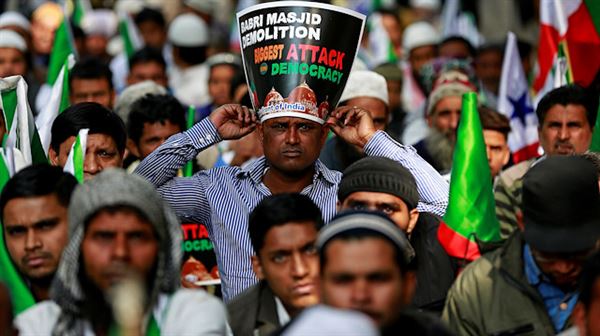A senior Indian lawyer, who represented Muslim parties in the Babri Mosque case in the Supreme Court, on Tuesday said he has been dismissed from the c
A senior Indian lawyer, who represented Muslim parties in the Babri Mosque case in the Supreme Court, on Tuesday said he has been dismissed from the case.
“Just been sacked from the Babri case by advocate-on-record Ejaz Maqbool, who was representing the Jamiat [Ulema-e-Hind]. Have sent formal letter accepting the sacking without demur. No longer involved in the review of the case,” Rajeev Dhavan announced in a Facebook post.
Dhavan also rejected reports that he was removed due to health reasons.
“I have been informed that Arshad Madani [head of Jamiat Ulema-e-Hind] has indicated that I was removed from the case because I was unwell. This is total nonsense. He has a right to instruct his lawyer to sack me which he did on instructions. But the reason being floated is malicious and untrue,” he added.
However, All India Muslim Personal Law Board (AIMPLB), another Muslim party in the case, said that Dhavan will remain its lawyer and he had been removed by only Jamiat Ulema-e-Hind.
Kamal Farooqui, a member of the AIMPLB said: “This is a big mistake by the Jamiat. We apologize to Rajeev Dhavan. He will remain our lawyer, we will convince him. He did not charge us even one rupee. We are grateful to him.”
The case, which has been bitterly contested for decades by Hindus and Muslims, centers on the ownership of a land in northern Uttar Pradesh state.
On Nov. 9, the Supreme court of India ruled that the historical site of early 16th century Babri Mosque should be handed over to Hindus for the construction of Ram Temple.
The apex court also ruled that a “suitable plot” of land measuring 5 acres would be allotted to the Sunni Waqf Board either by the central government or provincial government to construct a mosque.
Madani, head of the Jamiat Ulema-e-Hind, said that the Muslim side will file a review petition in the Supreme Court.
“The main contention in the case was that the mosque was built by destructing a temple. The court said that there was no evidence that the mosque was built after destructing a temple, the title of Muslims therefore was proven, but the final verdict was the opposite. So we are filing a review as the verdict is beyond understanding,” he said.
Built in 1528 under the rule of first Mughal emperor Babur, the grand mosque along with a land of 2.77 acres was demolished by a group of radical Hindus in 1992. Hindus claimed one of their gods, Lord Ram, was born at the site of the mosque.
